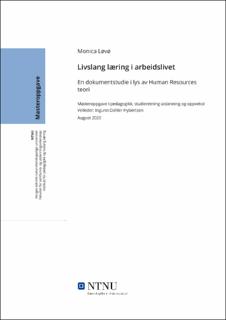Livslang læring i arbeidslivet - En dokumentstudie i lys av Human Resources teori
Master thesis
Permanent lenke
https://hdl.handle.net/11250/2784727Utgivelsesdato
2020Metadata
Vis full innførselSamlinger
Sammendrag
I denne oppgaven diskuteres livslang læring som konsept i arbeidslivet. Raske endringer stiller krav til omstilling og kompetanse. Skal vi stå lenger i arbeid og evne å håndtere en omstillingsprosess, blir våre muligheter for å utvikle vår kompetanse helt avgjørende. Livslang læring i arbeidslivet er høyt på den politiske dagsorden, men hvorfor er det så viktig, og hva er egentlig livslang læring? Hvilke begrunnelser finnes i styrende dokumenter for livslang læring i arbeidslivet? Følgende problemstilling blir undersøkt i denne oppgaven: «Hva er begrunnelsene for livslang læring i arbeidslivet i styrende dokumenter, og hvordan kan disse ses i lys av HR-teori?». For å belyse problemstillingen har jeg benyttet de styrende dokumentene NOU 2019: 12 Lærekraftig utvikling – Livslang læring for omstilling og konkurranseevne og Meld. St. 14 Kompetansereformen – Lære hele livet (Kunnskapsdepartementet, 2020). Dette ses i lys av relevant teori innen HR. HR (Human Resources) kan knyttes til ledelse og utvikling av menneskelige ressurser. Med utgangspunkt i de styrende dokumentene blir det sett nærmere på hva livslang læring i arbeidslivet er, samt hvilke begrunnelser som finnes for livslang læring som konsept. Begrunnelser for livslang læring i arbeidslivet blir i denne oppgaven presentert på individ-, organisasjons- og samfunnsnivå. Det diskuteres videre hvordan funn på disse nivåene kan ses i lys av HR-teori. Det ses spesielt på hvorvidt begrunnelser på de ulike nivåene kan relateres til myk og hard HR, som kan ses på som to idealtyper for hva som regnes som effektiv HR. Også disse dokumentene presenterer en idé om hvordan ting bør være, heller enn hvordan ting nødvendigvis er. Det er interessant å se nærmere på hvorvidt idealmodellene for myk og hard HR kan relateres til begrunnelsene som finnes i styrende dokumenter for livslang læring i arbeidslivet.I begge de styrende dokumentene legges det vekt på at læring hele livet er viktig for både individet, for virksomheter og for samfunnet som helhet. Selv om flere av begrunnelsene for livslang læring i arbeidslivet kan synes å relateres til myk HR og dens opptatthet av menneskers behov for utvikling, kan det likevel stilles spørsmål ved om begrunnelser for livslang læring i arbeidslivet også kan synes å tendere i retning av hard HR, med en økonomisk rasjonell tilnærming og en instrumentell bruk av arbeidskraft for å oppfylle forretningsmessige mål. Gjennom at individet vektlegges som en viktig ressurs i et kunnskapsintensivt samfunn, kan man spørre om de menneskelige ressursene, på samme måte som andre ressurser, håndteres på en økonomisk rasjonell måte. Begrunnelser for livslang læring i arbeidslivet vil med et slikt utgangspunkt bunne i en såkalt økonomisering av mennesket, der marked, konkurranse og gevinst blir viktige stikkord. In this thesis, lifelong learning is discussed as a concept in working life. Rapid changes place demands on change and competence. If we are to stay longer in work and the ability to handle a restructuring process, our opportunities to develop our competence will be absolutely crucial. Lifelong learning in working life is high on the political agenda, but why is it so important, and what exactly is lifelong learning? What justifications are there in governing documents for lifelong learning in working life?The following issue is examined in this thesis: "What are the reasons for lifelong learning in working life in governing documents, and how can these be seen in the light of HR theory?". To shed light on the problem, I have used the governing documents NOU 2019: 12 Lærekraftig utvikling – Livslang læring for omstilling og konkurranseevne og Meld. St. 14 Kompetansereformen – Lære hele livet (Kunnskapsdepartementet, 2020). This is seen in the light of relevant theory within HR. HR (Human Resources) can be linked to the management and development of human resources.Based on the governing documents, a closer look is taken at what lifelong learning in working life is, as well as what justifications exist for lifelong learning as a concept. Reasons for lifelong learning in working life are presented in this thesis at the individual, organizational and societal level. It is further discussed how findings at these levels can be seen in the light of HR theory. It is looked at in particular whether justifications at the various levels can be related to soft and hard HR, which can be seen as two ideal types for what is considered effective HR. These documents present an idea of how things should be, rather than how things necessarily are. It is interesting to look more closely at whether the ideal models for soft and hard HR can be related to the justifications found in governing documents for lifelong learning in working life.In both the governing documents, emphasis is placed on the fact that lifelong learning is important for both the individual, for companies and for society as a whole. Although several of the reasons for lifelong learning in working life may seem to be related to soft HR and its preoccupation with people's need for development, it can still be questioned whether reasons for lifelong learning in working life may also seem to tend towards hard HR, with an economically rational approach and an instrumental use of labor to meet business goals.By emphasizing the individual as an important resource in a knowledge-intensive society, one can ask whether the human resources, in the same way as other resources, are handled in an economically rational way. Reasons for lifelong learning in working life will, with such a starting point, be based on a so-called economisation of people, where market, competition and profit become important keywords.
